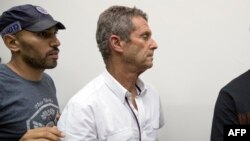Beny Steinmetz, a 66-year-old mining tycoon who made his fortune in diamonds, argued through his lawyer that the Guinea bribery case against him was "very weak", and insisted the lower court had reached "an erroneous and unjust conclusion."
"He is innocent... There is no criminal offence," Daniel Kinzer told the court in his closing statement, urging the judges to look at the facts "with fresh eyes".
Steinmetz was found guilty in January 2021 of setting up a complex financial web to pay bribes to ensure his company could obtain permits in Guinea's southeastern Simandou region, which is estimated to contain the world's biggest untapped iron ore deposits.
He was sentenced by a Geneva court in 2021 to five years in prison and ordered to pay 50 million Swiss francs ($52 million) in compensation.
Kinzer spent more than three hours Monday striving to knock down the prosecution's case and poke holes in the original verdict.
He insisted that there "was no element of proof" that his client had participated in corruption, and that the massive mining project Beny Steinmetz Group Resources (BSGR) set up in Guinea was not at all the cash-grab depicted by the prosecution.
It would have "profited Guinea", he insisted.
When he testified last week, Steinmetz insisted he never corrupted anyone, adding that BSGR had itself fallen victim to a local power struggle and corruption.
During the original trial, prosecutors convinced the court Steinmetz and associates had bribed a wife of then Guinean president Lansana Conte and others in order to win lucrative mining rights in Simandou.
The prosecutors said Steinmetz obtained the rights shortly before Conte died in 2008 after about $10 million was paid in bribes over a number of years.
Conte's military dictatorship ordered global mining giant Rio Tinto to relinquish two concessions that were subsequently obtained by BSGR against an investment of $160 million.
Just 18 months later, BSGR sold 51 percent of its stake in the concession to Brazilian mining giant Vale for $2.5 billion.
But in 2013, Guinea's first democratically-elected president Alpha Conde launched a review of permits allotted under Conte and stripped the VBG consortium, formed by BSGR and Vale, of its permit.
Prosecutors claim Steinmetz and his associates entered a "pact of corruption" with Conte and his fourth wife Mamadie Toure to obtain the exploration rights -- a charge he flatly rejects.
Toure, who has admitted to having received payments, has protected status in the United States as a state witness.
The defence insists there was nothing inappropriate about how BSGR obtained the permits, and that Rio Tinto lost half the concessions for failing to develop them.
Kinzer charged that many of the allegations against his client in the complex case relied fully on Toure's written testimony, despite lacking insight into the "opaque" US deal and no defence access to question her about her statements riddled with "contradictions".
The findings of the lower court were "deeply confused", he said, also questioning whether there were grounds for trying the case in Switzerland at all.




